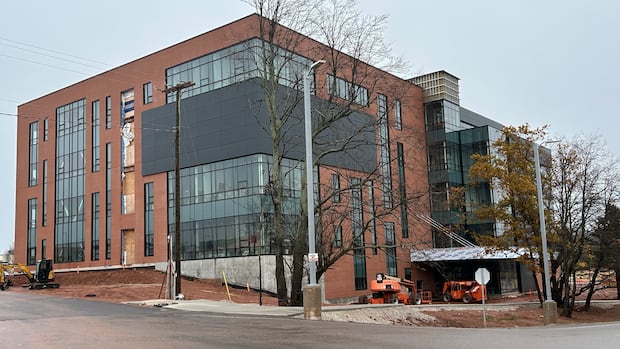Science
UPEI Launches Innovative Medical Simulation Centre for Students

The University of Prince Edward Island (UPEI) has inaugurated its new Clinical Learning and Simulation Centre, designed to enhance the education of medical students through realistic training experiences. This facility employs advanced technology, including manikins and simulation environments, to prepare future healthcare professionals for real-life patient interactions.
Catherine O’Brien, a local actor and director, is one of the team members contributing to the new centre. Her journey began in Ontario, where she assisted in a program at the University of Toronto, portraying simulated patients to aid medical students. At UPEI, she continues this work, helping students develop essential skills such as patient interviewing and empathetic communication.
“They will learn how to interview, how to ask the right questions, how to make the patient feel comfortable using empathy,” O’Brien explained during a recent interview on CBC’s Island Morning. At the Clinical Learning and Simulation Centre, O’Brien and other standardized patients interact with students in a controlled environment, allowing them to practice clinical scenarios without the pressure of real-life stakes.
Realistic Training for Future Professionals
The centre is equipped to replicate clinical settings, including hospital rooms with medication carts and vital signs monitors. Paul Charles, the centre’s simulation program manager, emphasized the importance of realistic training. “We do that by recreating the simulation rooms like clinical hospital rooms,” he stated. High-fidelity manikins are an integral part of this training, capable of simulating breathing, talking, and experiencing medical emergencies such as heart attacks or seizures.
This hands-on approach aims to bridge the gap between classroom education and practical experience, ultimately enhancing student competence and confidence. Charles highlighted the broader impact of effective training on patient outcomes, stating that well-prepared healthcare professionals can reduce the demand on the healthcare system and potentially save lives.
Expanding Training Opportunities
The centre’s resources are available not only to students but also to practicing healthcare professionals seeking to refine their skills. Tammie Muise, the centre’s director, noted the introduction of a new “simulation rig,” which will allow training to occur in real healthcare settings. This mobile unit, resembling an ambulance, can simulate emergency scenarios such as strokes or heart attacks, where timely intervention is crucial.
“If they were simulating a situation where the ambulance was pulling up with someone who was having a stroke or a heart attack, they could simulate that experience,” Muise explained. This approach ensures that healthcare professionals can rehearse critical skills in settings that mimic actual emergency situations.
As UPEI prepares to welcome its inaugural cohort of medical students, O’Brien is enthusiastic about the upcoming training sessions. “I have a few coming up, which I’m excited to get going with,” she said, looking forward to contributing to the education of future healthcare leaders in Prince Edward Island.
The establishment of the Clinical Learning and Simulation Centre marks a significant advancement in medical education at UPEI, equipping students and professionals with the tools they need to excel in the ever-evolving healthcare landscape.
-

 Politics4 weeks ago
Politics4 weeks agoSecwepemc First Nation Seeks Aboriginal Title Over Kamloops Area
-

 World5 months ago
World5 months agoScientists Unearth Ancient Antarctic Ice to Unlock Climate Secrets
-

 Entertainment5 months ago
Entertainment5 months agoTrump and McCormick to Announce $70 Billion Energy Investments
-

 Science5 months ago
Science5 months agoFour Astronauts Return to Earth After International Space Station Mission
-

 Lifestyle5 months ago
Lifestyle5 months agoTransLink Launches Food Truck Program to Boost Revenue in Vancouver
-

 Technology3 months ago
Technology3 months agoApple Notes Enhances Functionality with Markdown Support in macOS 26
-

 Lifestyle3 months ago
Lifestyle3 months agoManitoba’s Burger Champion Shines Again Amid Dining Innovations
-

 Top Stories2 months ago
Top Stories2 months agoUrgent Update: Fatal Crash on Highway 99 Claims Life of Pitt Meadows Man
-

 Politics4 months ago
Politics4 months agoUkrainian Tennis Star Elina Svitolina Faces Death Threats Online
-

 Sports5 months ago
Sports5 months agoSearch Underway for Missing Hunter Amid Hokkaido Bear Emergency
-

 Politics5 months ago
Politics5 months agoCarney Engages First Nations Leaders at Development Law Summit
-

 Technology5 months ago
Technology5 months agoFrosthaven Launches Early Access on July 31, 2025





















